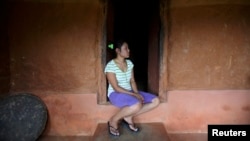As 14-year-old Neha Gurung scrolls through pictures posted on a social media website that show her friends going out and having fun, her dark eyes remain sad and no smile lights up her face.
Brought up in Nepal by a single mother, Neha is stateless - a problem due to a Nepalese law that prevents women passing on their nationality to their children.
This means Neha has no identity card, and this severely restricts every aspect of her life, as it does those of hundreds of thousands of other people in Nepal who are also believed to be stateless.
"I'm like a kind of prisoner in my own country," Neha says in "My children's future," a film launched on Thursday by the Equal Rights Trust to draw attention to laws in 27 countries that deny women the right to pass on their nationality to their children.
"I feel really sad when I see all my friends enjoying every right that my state provides to them, and I feel really sad that my state doesn't recognise me as its citizen and I'm unable to travel to any part of the country," says Neha.
With no nationality, people are denied basic rights that most others take for granted, including access to education, healthcare and jobs. Many live in destitution and risk detention and exploitation.
In Madagascar, Sofia Binty Abdallah was unable to pass on her nationality to her son Yousef after her husband left her when she was pregnant.
"I would like him to get a job ... a degree ... to become a mechanic with a driver's licence, so that he can have a stable situation," she says in the film.
Unable to get legitimate employment, Yousef relies on his mother to provide for him, his wife and their newborn child.
"This film draws attention not only to the situation in Madagascar and Nepal but to the 25 other countries with gender discriminatory nationality laws," Dimitrina Petrova, executive director of the Equal Rights Trust, said in a statement.
"They must address the fact that these laws are fueling statelessness, trapping thousands in poverty, and doing little to promote equal rights for all."
There are an estimated 10 million stateless people worldwide with large numbers in Nepal, Myanmar, Thailand and Ivory Coast.





